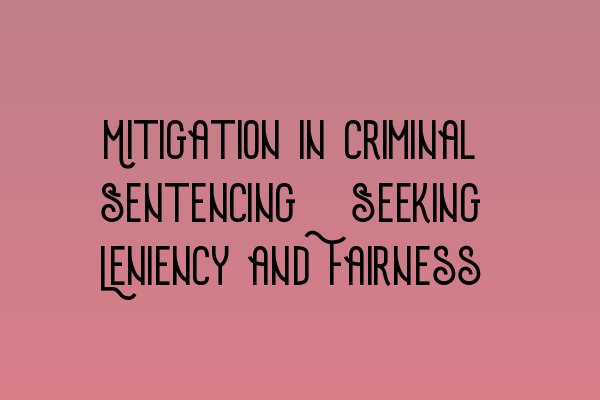Mitigation in Criminal Sentencing: Seeking Leniency and Fairness
When it comes to criminal sentencing, the concept of mitigation plays a crucial role in seeking leniency and fairness for individuals facing charges. Mitigation refers to the process of presenting evidence or arguments that can reduce the severity of a sentence imposed by the court.
In this article, we will explore the importance of mitigation in criminal sentencing, its various forms, and how it can be a valuable strategy for criminal defense lawyers and solicitors. We will also provide an overview of related courses and practice resources, such as SQE 1 Practice Exam Questions and SQE 1 Practice Mocks FLK1 FLK2, that can aid in preparing for the SQE exams.
The Purpose of Mitigation
Before delving into the specifics of mitigation, it is essential to understand its purpose in criminal sentencing. The primary objective of mitigation is to secure a fair and proportionate sentence that reflects the individual circumstances and characteristics of the offender.
Through mitigation, solicitors and defense lawyers can present evidence and arguments that highlight factors such as remorse, rehabilitation efforts, mental health issues, and personal circumstances that may have contributed to the commission of the offense. By doing so, they aim to convince the court to impose a sentence that considers these mitigating factors, resulting in a fair outcome for the defendant.
Forms of Mitigation
Mitigation can take various forms, depending on the nature of the offense and the specific circumstances of the case. Some of the common forms of mitigation include:
- Character References: Character references from family, friends, colleagues, or community members can provide insight into the individual’s positive traits, achievements, and contributions to society. These references can help the court develop a more comprehensive understanding of the defendant’s character, potentially leading to a more lenient sentence.
- Expressions of Remorse: Demonstrating genuine remorse for the offense committed can be a powerful form of mitigation. Encouraging clients to express their regret, apologize to the victim or affected parties, and emphasize their commitment to making amends can significantly impact the court’s view of the defendant.
- Rehabilitation Efforts: Highlighting efforts made by the defendant to rehabilitate themselves or seek treatment for underlying issues, such as substance abuse or mental health problems, can also be an effective form of mitigation. Providing evidence of participation in counseling programs, support groups, or educational courses can demonstrate a commitment to change and reduce the likelihood of reoffending.
- Personal Circumstances: Presenting evidence of challenging personal circumstances, such as a difficult upbringing, financial struggles, or family responsibilities, can help contextualize the offender’s actions. This information can help the court understand contributing factors and consider a more lenient sentence.
The Role of Criminal Defense Solicitors
Criminal defense solicitors play a crucial role in crafting and presenting effective mitigation strategies for their clients. By thoroughly assessing the individual circumstances of each case, conducting detailed interviews with clients and their loved ones, and gathering relevant evidence, defense solicitors can build a compelling case for leniency.
Furthermore, solicitors guide clients through the process, explaining the significance of mitigation, the potential impact it can have on their case, and the different forms of mitigation available. They work hand in hand with clients to identify and present the most relevant mitigating factors to the court, ensuring the entire process is conducted ethically and professionally.
Preparing for the SQE Exams with SQE Criminal Law & Practice Law UK
If you are considering a career in criminal law, acquiring the necessary knowledge and skills is paramount. SQE Criminal Law & Practice Law UK offers comprehensive preparation courses for the Solicitors Qualifying Exam (SQE) to help aspiring solicitors excel in their profession.
Whether you are preparing for the SQE 1 or SQE 2 exams, you can benefit from SQE 1 Preparation Courses and SQE 2 Preparation Courses provided by SQE Criminal Law & Practice Law UK. These courses cover all the essential topics, including mitigation, providing you with the tools and knowledge to excel in your career.
Additionally, to enhance your preparation, you can access resources such as SQE 2 Preparation Courses and SQE 1 Preparation Courses to gain a deep understanding of criminal law principles and practice.
Stay updated with the latest SQE exam dates by visiting SRA SQE Exam Dates.
Conclusion
Mitigation is a vital aspect of criminal sentencing, providing individuals with an opportunity to seek leniency and fair treatment. By employing various forms of mitigation, solicitors and defense lawyers can present a comprehensive case that considers the individual circumstances and characteristics of the offender.
For those aspiring to pursue a career in criminal law, proper preparation is crucial. By taking advantage of preparation courses and resources available at SQE Criminal Law & Practice Law UK, you can equip yourself with the necessary knowledge and skills to excel in the profession.
Remember, mitigation is not only about seeking leniency—it is about ensuring that justice is served fairly and proportionately.
